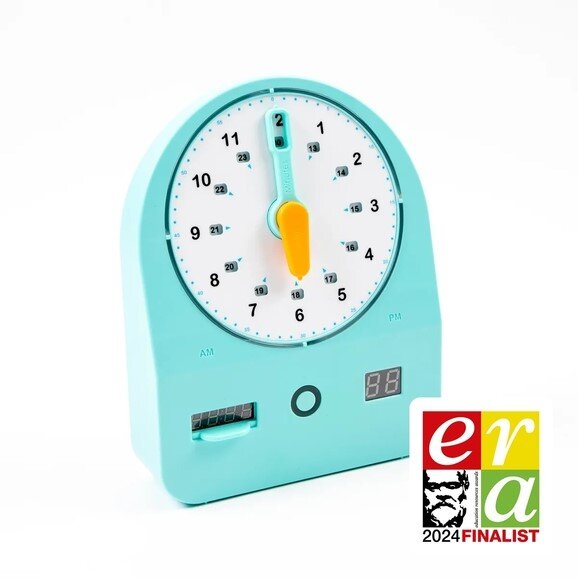
Articles
We aim to give food for thought as well as inspiring your creativity and
providing practical ideas you can’t wait to implement in your own settings!
About time!

If you’ve got a few minutes to kill,
And you don’t yet have to run
Why not read this article?
Time flies when you’re having fun!
I know it’s of the essence,
But it might be worth the slog,
It’s a sign of the times in this ‘here today’ age,
That there’s little room for a blog!
It’s been fun trying to think of idioms,
I’ve had quite a whale, I must say,
But I’m here today, gone tomorrow,
So, it’s time to call it a day!
Time is known to be one of the most difficult concepts to teach and it’s not surprising when you consider how complex and abstract it is.
There are so many elements involved in our understanding of time and they are all important in terms of life skills - arguably more so than any other mathematical area, as our lives are so built around the concept.
There’s a lot of vocabulary!
Here is just a selection…
after
Alarm
Annual
Autumn
Afternoon
AM
Bedtime
Belated
Biennial
Before
Calendar
Clock
Chronology
Century
Day
Dial
Digital clock
Decade
Delayed
Early
Ear
Epoch
Evening
Fortnight
Future
Hands
Hour
Late
Leap year
Moment
Midnight
Midafternoon
Millennium
Month
Noon
Night
Now
O’clock
Past
PM
Period
Present
Quarter
Spring
Summer
Sunset
Season
Stopwatch
Sundial
Second
Soon
Sunrise
Tardy
Today
Tomorrow
Timetable
Tonight
Twilight
Watch
Winter
Week
Year
Yesterday
zone
Very early on, children learn to describe and compare time, with vocabulary such as, slower, faster, earlier, later, today, etc. Although these terms are obviously commonly used, we should not take it for granted that all children will understand them. Many children get ‘yesterday’ and ‘tomorrow’ mixed up, for example, that’s even before extra complications such as ‘the day before yesterday, and ‘the day after tomorrow’.
Learning and ordering the days of the week can also be challenging, as are the months of the year; many older children struggle to remember them all in order. And many adults still say the little rhyme to be able to remember how many days are in each month!
“30 days hath September,
April, June and November.
All the rest have 31,
Except for February alone
Which has 28 days clear,
And 29 in each leap year.”
Remembering through rhyme or song is a very good technique though!
Here is one example of a fun rap you might use with children, or even better to make up your own with together.
January, February,
March, April, May,
June, July and August
are on their way!
September and October
are nearly here…
November and December
at the end of the year!
Collect time idioms
There are so many time-related idioms (as the poem above tries to show).
How many can you come up with?
You could create a class collection of them; illustrate and display or make your own poems using as many as possible. Here are just a few to get you started:
Once in a blue moon
In the nick of time
Time is of the essence
Better late than never
A stitch in time saves nine
Telling the time
Learning to tell the time requires many mathematical building blocks to be in place, especially analogue time. (Using digital clocks is simpler of course but it’s much more helpful to know both.)
Children need to know:
Position and direction – to and past, before and after, turns, clockwise, anti-clockwise
Fractions – quarter, half, three-quarters
Numbers – reading digits to 60, bonds to 60, Roman numerals
Calculations – 5 x table, addition and subtraction skills to calculate times and durations of time
Reading and understanding charts and how timetables work – 24 hour clock
With all this to consider, and with children at different stages in their understanding, it’s not surprising that it can be tricky to teach.
Here are 3 suggestions of resources that might be helpful:
FREE WOW lesson
Dave Godfrey has written a series of maths lessons all about tricky-to-teach topics and we are sharing his excellent time lesson for free until the end of May.
There is much more than a lesson here, there’s enough for several sessions! It is aimed at year 3, but suitable for recapping and really embedding understanding with older groups too. Part of the lesson involves Dave creating a huge garden clock before our eyes. He builds up the component parts and gives a brilliant explanation about how they all work together.
Access the lesson here

A new Teaching Clock
Hope Education has a brilliant brand-new resource to make practicing telling the time a little easier.
This Teaching Clock includes both digital and analogue, 12 and 24 hours and Roman numerals. This clock has many great features, but the best is that it is interactive. Children can play games independently with 4 difficulty levels and the clock keeps score!
Take a closer look

Number Fun
Songs and poems are always a great way to help children remember information. Maths expert, Dave Godfrey is a true believer in the power of music and has written 100s of songs to help children with all areas of maths. The songs also have accompanying videos to engage children even more.
Number Fun is coming soon to EuHu, but here is a free taster of one of the songs about time.
